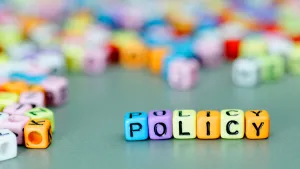Editorial Note
Thank you to our generous sponsors, Sociologists for Women in Society, Center for Equity Education, Azama Development Foundation, and Sociological Practice & Public Sociology (SPPS) – American Sociological Association (ASA) for helping us make Applied Worldwide’s 2023 “Why is Sociology Important?” student essay competition a success!
This essay on sociology and everyday life was published on behalf of Applied Worldwide’s 2023 Global Student Essay Competition. For the 2023 competition, we awarded 16 student essayists across eight countries and one US territory and will be sharing each winning essay in our “Why is Sociology Important?” essay collection.
This sociology essay was written by Bernice Danjuma, a fourth year sociology student at York University in Canada and earned a 2nd place prize in the competition.
Sociology and Everyday Life, Bernice Danjuma
Someone once said to me, “don’t study sociology if you want to be happy.” Whoa! I thought, why would that be? Am I bound to be unhappy for choosing sociology? I was a first-year student you see and had just begun my studies in sociology. I couldn’t bring myself to change my program on the basis of what that person said to me even though I was scared of what that statement implied. So, I stayed and as I engaged in my studies, well I thought; this is knowledge everyone should have, its not the kind that should just sit somewhere for those who choose to specialize in it – its about our society and everyone is a part of a society. I encountered the questions I’ve wondered about and even those I haven’t wondered about. What sociology has ultimately shown me is human society and the way we’ve constructed it.
Sociology is important because it confronts a hegemonic social order. Schudson writing in 1982 gave a most brilliant definition of hegemony – “the home of a dominant class that promotes a worldview to the population at large that serves its own interests at the expense of others; this worldview comes to be accepted as ‘common-sense’ and so they conspire in their own subordination, accepting beliefs and values that justify the unequal distribution of power and rewards in society” (p. 26). A hegemonic order is one that reproduces oppressive interests. It is important to confront a hegemonic social order because often we don’t realize we’re making assumptions, because they are completely embedded in the way that we, and those around us understand the world. A lot of the everyday world is shaped by larger social orders and discourses. You may hegemonically go with everything because you think its not your problem today, but it’ll most likely be your problem tomorrow. A hegemonic social order feeds on ignorance and maintains itself. There seems to be a false notion that ignoring systemic issues will make them go away or that getting involved in systemic issues will make you unhappy. Nothing could be further from the truth – when has pretending something does not exist ever solved the problem or truly made anyone happy?
Martin Niemöller in the post World War two period said, “First, they came for the socialists, and I did not speak out—because I was not a socialist. Then they came for the trade unionists, and I did not speak out—because I was not a trade unionist. Then they came for the Jews, and I did not speak out—because I was not a Jew. Then they came for me—and there was no one left to speak for me.” Niemoller statement encapsulates the ways we may choose to be complaisant with things that appear not to be our problem today, only for it to become our problem tomorrow. It may not happen immediately but it’ll eventually. One of Sociology’s importance is that it equips us with the skills and knowledge needed to speak out or take action. Especially in current times of many controversial issues. The importance of sociology grows apparent and valuable everyday in a world of social issues. Not doing something is also doing something, it is also an action.
At the end of my first year, I got to realize Sociology is debunking those “common sense” ideas that are robbing us of a more egalitarian and just society. In this sense, ignorance is not bliss – it propagates the problem. If you don’t even know about a problem or you know and ignore it, you can’t solve it. It is equipping us with skills that help us understand each other and our systems and structures better. I understand now why that person had told me not to study sociology if I want to be happy (or at least I think I do). Its probably because happiness is equated to ignorance and sociology does nothing if not strips you of ignorance and commonsensical ways of thinking. This does not mean that there is something wrong with all commonsensical ways of thinking, it just means the ability to critically think about it. Consequently, you are able to think in new and different lights that establish inclusivity not new ways of exclusivity. Because it is possible to replace one problem with another problem. The hegemony is challenged when we are able to be selective and reflective of the daily narratives we are faced with.
Our capacity to make choices is important, we are not – at the end of the day – predetermined by larger social forces. Our social agency should not be taken for granted because it is part of what produces and reproduces comparisons, hierarchies, and normalizations. Sociology’s wisdom is in illustrating to us that our personal everyday experiences can be linked to larger social structures and systems. If we don’t do this, worldviews that function at our detriment become normalized and taken-for-granted as true. Ultimately, we participate in our own subordination.
The United States vs Billie Holiday opens with an interesting scene where an interviewer asks Billie Holiday what its like to be a coloured woman. She replies, “Would you ask Dorris Day a question like that?” The interviewer laughs and looks at her as though she is silly and says “well Dorris Day is not a coloured woman silly”. This seems to make sense, right? Dorris Day is not a coloured woman so why ask her what its like to be a coloured woman and Billie Holiday is a coloured woman so why not ask her what its like to be a coloured woman. Oh, the subtlety of these things; the bigger question though, is why won’t Dorris Day be asked what its like to be a white woman? But Billie Holiday can be asked what its like to be a coloured woman. This is reflective of normalized ways of thinking and perhaps even talking. The thing with normalizations is that they are not questioned: who and what is being represented and who and what is not being represented is of utmost importance in Sociology. Admittedly, it can be challenging to be critical of things we consider “normal” and just a part of everyday life, but sociology empowers us with these tool kits for examining our society and ultimately ourselves. The subtlety of these things and the way they are embedded in our everyday lives is where its power lies.
What’s in everyday life that can make a change one may ask? In everyday life we encounter relationships, conversations, culture, family. “You are not acting your age”, “be more socially active”, “you should be doing this”. Voices that implore ways we should be living our lives. These are examples of preconceived notions of what is acceptable and what is not – and they appear in everyday life. The way we make sense of the world and access the adequacy of these notions. Sociology equips us with the importance of context. Sociology has helped to understand that contexts must be understood before its effect and meaning can be understood. What is true for one context may not be true for another context.
Billy-Anne (incognito for a friend) told me at dinner one day that two people had said the same thing to her, but she had understood it differently, in essence, two different contexts. When the barrister told her a political joke, she thought it was offensive and inappropriate – it did not fit into the established societal rules in her head and this type of social interaction. However, the same joke was told to her by a friend, and she perceived it differently. In retrospect, Billy-Anne realized this was due to different contexts. A classic example of how context affects meaning. According to Billy-Anne, since she started studying sociology, she had become more aware of her social settings and culture. Sociology does seem almost psychological, seeping into ways of thinking. For Billy-Anne, she has found the relevance of Sociology for herself and her social interactions. This discipline is also applicable in many facets of life, and many career paths – because whatever path you walk, you always have to deal with people and work in a society.
Sociology helps us understand the importance of unity. We have all willingly and unwillingly participated in hegemony. We need each other, we cannot decolonize and unpack harmful systems alone. Sociology is about community. To alienate yourself from systemic issues is to subject yourself to it. The writing, the reading offers us skills that empower us outside of the classroom and in the classroom. Inequality, racism, marginalization, to name but a few, function on our ignorance. Sociology demands that we challenge hegemonic orders. You learn about systems and structures and even your own social agency in such a way that you start thinking, rethinking, and unthinking ideologies.
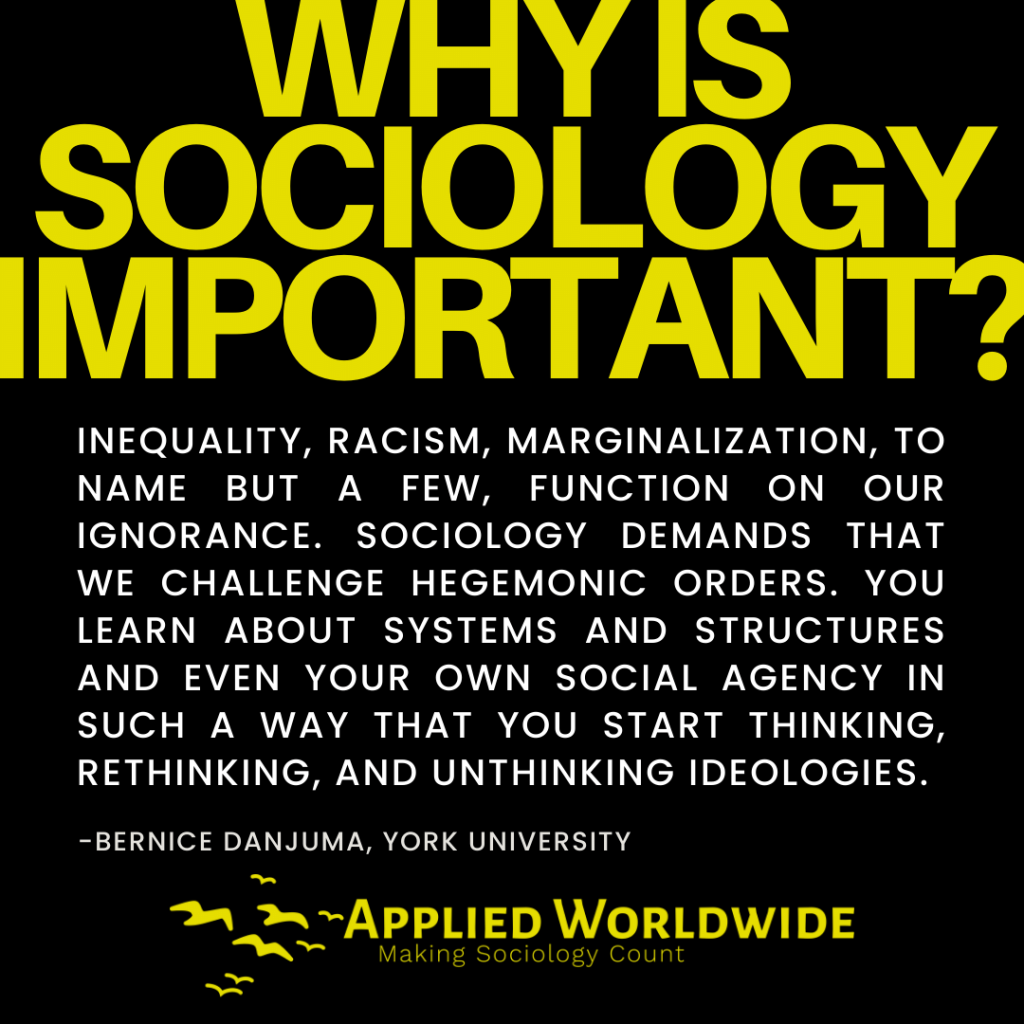
The sociological imagination illustrates to us that the person and society are intertwined. Its an interconnected relationship – and this is why its relevance spans wide for everyone. By ingraining an ideology into the structures and systems; you teach people a certain way of behaving. Ironically, people are then blamed for following how they were taught to behave. In a world that tends to individualize every problem, as though we are not simultaneously a society – sociology opens our eyes to the social factors of everyday problems. Consider a person seeking employment, this person is most likely to be blamed for their unemployed state rather than addressing the socio-political conditions that creates job shortages and barriers to getting employed. Such narratives mask the operations of power, and makes people believe they just have to work harder.
As we consider the golden relevance of Sociology let’s also consider that the goal is peace, not new ways of exclusion. The importance of sociology spans far and wide, I believe into all facets of our life. Consequently, I know that society may not do a total 360-degree change because of sociology, but it won’t stay the same either. If we do this together then perhaps the path to positive change wouldn’t be so lonely. Now when I think about Sociology, I am grateful for how it has empowered my critical thinking skills. Ordinary people living our everyday lives need sociology, it teaches us the power that lies in our everyday lives and decisions.
References
- Schudson, M. (1982). Culture and integration of national societies. The Sociology of Culture: Emerging Theoretical Perspectives, 21-43.
- https://encyclopedia.ushmm.org/content/en/article/martin-niemoeller-first-they-came-for-the-socialists
- Daniels, L. (Director). (2021). The United States vs Billie Holiday https://media3-criterionpic-com.ezproxy.library.yorku.ca/htbin/wwform/006?T=AL000335
Meet our 2023 Global Student Essay Competition Sponsors!
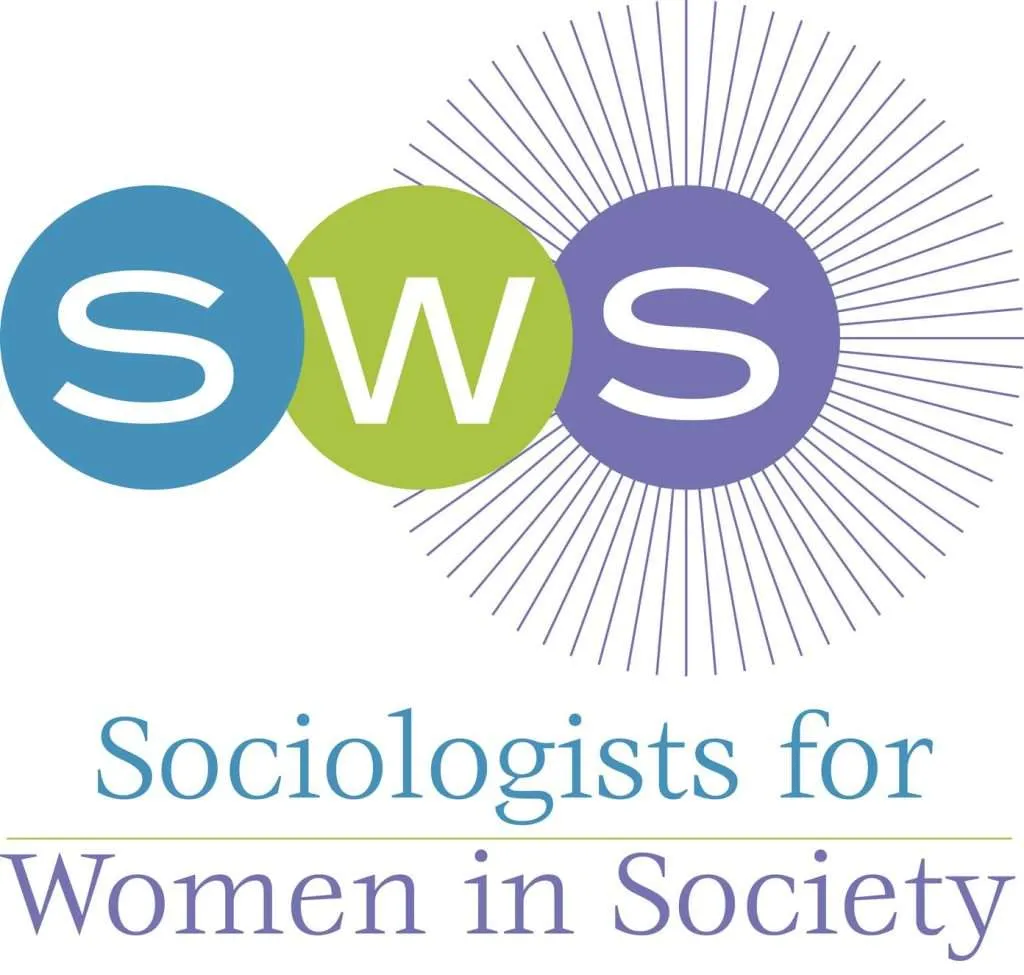
Sociologists for Women in Society is a nonprofit professional feminist organization dedicated to:
- Encouraging the development of sociological feminist theory and scholarship
- Transforming the academy through feminist leadership, career development, and institutional diversity
- Promoting social justice through local, national, and international activism
- Supporting the publication and dissemination of cutting edge feminist social science

The Center for Equity Education is a 501c3 nonprofit dedicated to providing quality and affordable DEI&A, discrimination, harassment, and sexual harassment prevention and education services.
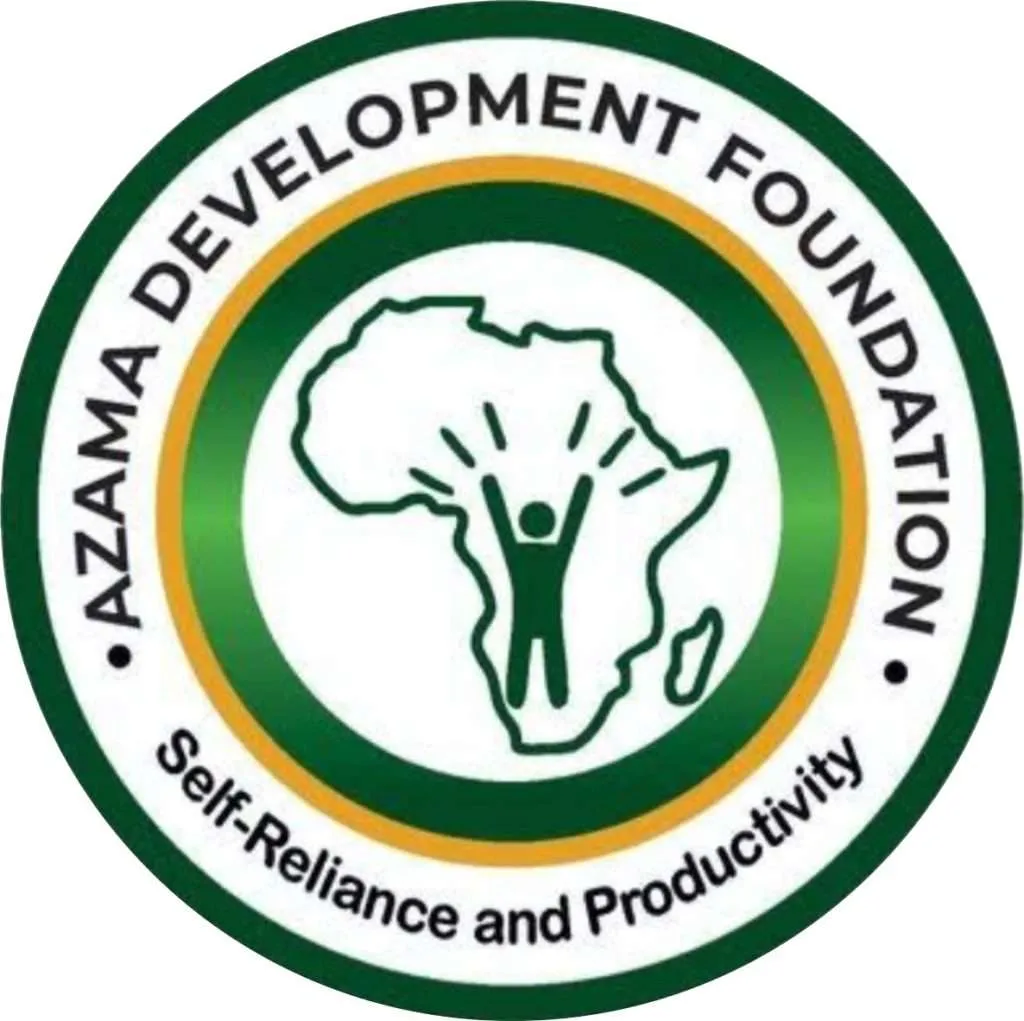
Azama Development Foundation is a Non-governmental organization that actively works towards the development of youths and women to be self-reliant and productive. Our mission is to transform the lives of youths and women from all over Africa to be self-reliant and productive actively contributing to national economy, education and development, thereby eradicating poverty, illiteracy and lack of enlightenment in the region.
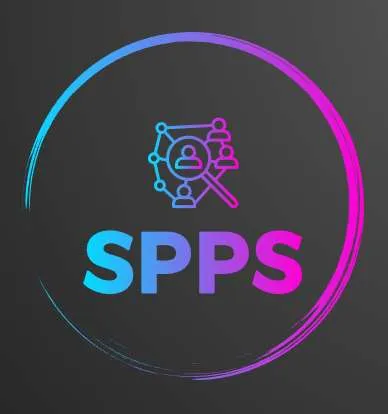
Sociological Practice & Public Sociology (SPPS) promotes the use of sociology to inform research, practice, and public policy beyond academia. In short, we focus on Making Sociology Actionable. SPPS focuses on public and applied sociology as a section under the American Sociological Association (ASA).






